Strategic Roadmapping and Technology Portfolio Selection for Heating Decarbonization in Canada
Author(s)
Shalash, Karim
DownloadThesis PDF (5.270Mb)
Advisor
de Weck, Olivier L.
Terms of use
Metadata
Show full item recordAbstract
Heating systems contribute significantly to Canada’s greenhouse gas emissions, accounting for approximately 117 megatons of CO₂ equivalent. demanding urgent decarbonization to meet national climate targets. This thesis employs the Advanced Technology Roadmap Architecture framework, integrating strategic roadmapping and technology portfolio selection methodologies to evaluate pathways for transitioning Canada’s heating sector to net-zero emissions by 2050. By analyzing historical emissions, forecasting adoption trends for key technologies like heat pumps, and conducting stakeholder-driven scenario analysis, this research identifies critical barriers to scaling low-carbon solutions, including high upfront costs, infrastructural limitations, and regional climatic constraints.
Seven representative heating architectures—air-source heat pumps, ground-source heat pumps, district heating, hydrogen-based systems, electric resistive heating, and conventional gas-fired furnaces—are evaluated comprehensively. Among these, district heating is particularly emphasized due to its potential for significant emissions reductions and minimal consumer-bearing initial cost of ownership, especially when strategically integrated with waste heat recovery from data centers. This integration utilizes otherwise wasted thermal energy, creating a robust symbiotic opportunity for urban and industrial decarbonization.
To support the practical deployment of these architectures, the thesis establishes a targeted technology portfolio comprising essential enabling and supporting technologies. Enabling technologies include centralized supervisory control systems, urban-scale district heating networks, inverter-driven compressors, advanced refrigerants, ground heat exchangers, and circulation pumps with variable frequency drives. Critical supporting technologies identified encompass building information modeling integration kits, cybersecurity modules, digital permitting platforms, smart thermostats, and thermal energy storage systems, among others.
This thesis further explores technology trade-offs, focusing on structural complexity, technology readiness, and associated risks of deployment. Through detailed modeling and stakeholder-informed scenario analysis, the thesis concludes that effective decarbonization of heating in Canada necessitates substantial policy interventions, robust financial incentives, targeted infrastructure investments, and region-specific strategies. The analysis indicates that a carefully allocated $8 billion catalyst investment could close approximately 60% of Canada’s heating emissions gap by 2050. Ultimately, district heating coupled with waste heat recovery emerges as a particularly promising strategic option, underscoring its transformative potential within a diversified approach to achieving Canada’s sustainable heating future.
Date issued
2025-05Department
System Design and Management Program.Publisher
Massachusetts Institute of Technology